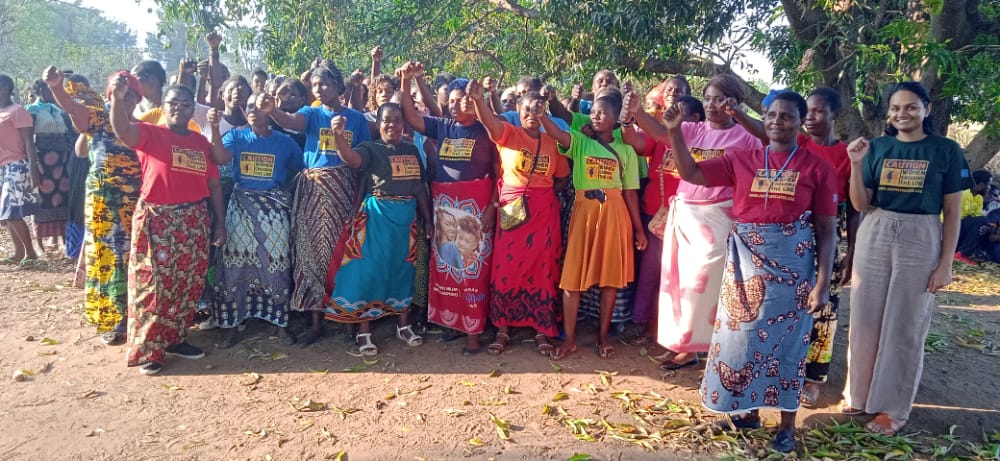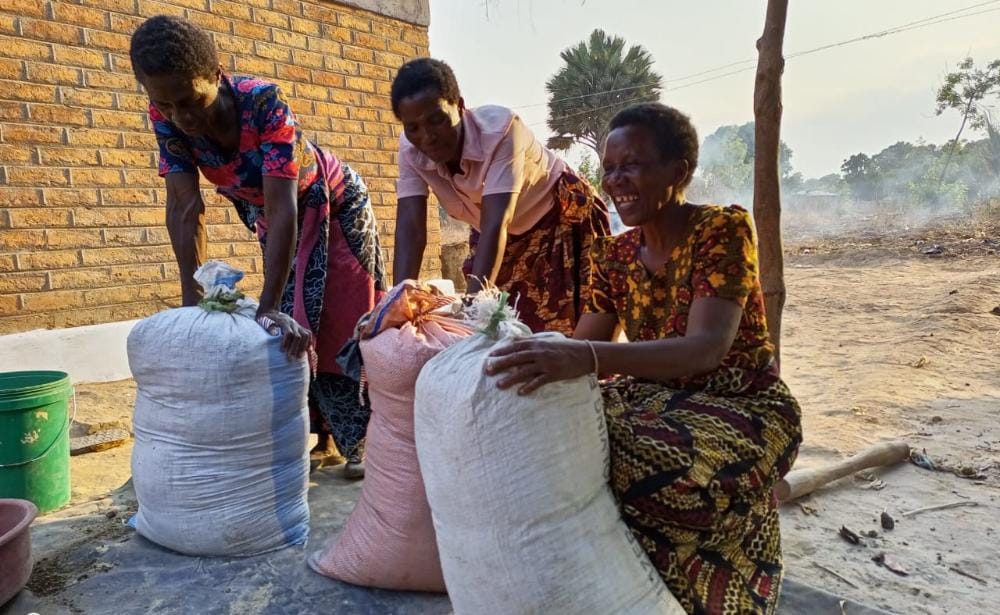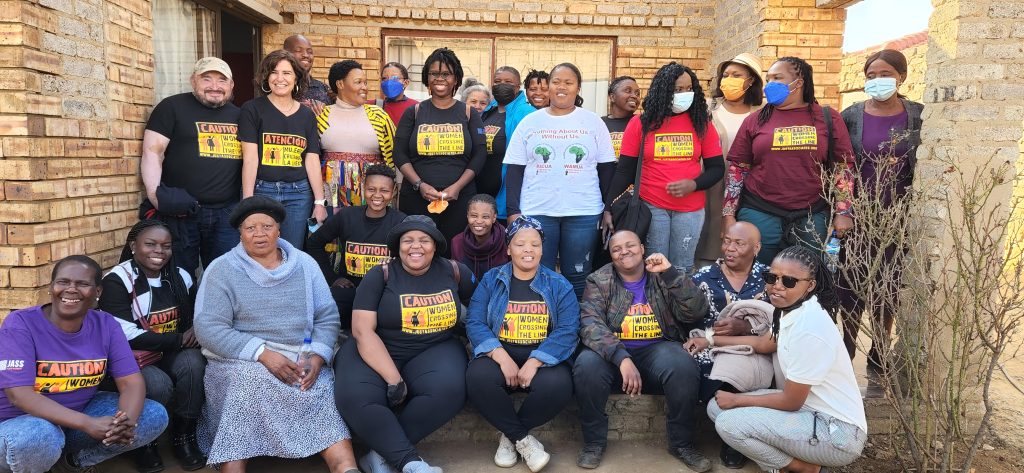Nyhet 2022-11-27
What constitutes violence?
Expanding our understanding of Gender-Based Violence
“What oppresses us is not just one person…The system is bigger than just one person. I now know about ‘patriarchy’, ‘capitalism’, ‘colonialism’, ‘culture’ and a lot of things that come together and oppress womxn. I also know that the things that oppress us are invisible and look normal.” – Zimbabwean participant in JASS Regional Convening on Structural Violence
Gender-Based Violence (GBV) is conventionally understood as the domestic and sexual forms of violence perpetrated against womxn and gender non-conforming persons. However, womxn’s lives are not neatly parcelled into separate spheres – what happens to womxn in private is not disconnected from the discrimination, exclusion, and inequity they face in their workplace, family, or community. And the strategies to address the former can’t be divorced from those for the latter. The personal is political – we must interrogate the economic, political, social, and cultural dynamics that directly affect womxn to fully understand and uncover the multifaceted nature of violence.
“Structural violence is that violence that is hidden in laws and cultures that it appears natural and normal, whilst it hurts other groups and disadvantages them.” – Womxn activist, Zimbabwe
In Southern Africa, JASS has been organising with womxn and LBTQI activists in Zimbabwe, South Africa, and Malawi to address a shared problem: structural violence and its many manifestations in their lives. This work, over several years, has supported womxn in understanding how daily inequities that are often normalised, such as limited access to water or electricity, economic insecurity, stigmatisation, and droughts and flooding because of climate change – all constitute violence.

Using a feminist participatory action research (FPAR)-based movement-building strategy, womxn use a power analysis to investigate and document instances of structural violence in their lives. The data they are gathering form the basis for building an organising agenda for collective action linked across their different contexts.
Malawi
Through FPAR processes, the longstanding 9800-strong movement, Our Bodies, Our Lives (OBOL) has surfaced unequal land ownership, society’s normalisation of violence, and stigmatisation of sex workers as manifestations of structural violence. For example, sex workers who have participated in JASS processes understand that transgressing social and gender norms that dictate how womxn should behave often comes with backlash. Realising the common roots of their problems, sex workers are building solidarity among each other and identifying ways to work together. One group co-created an advocacy strategy to report violence and a WhatsApp communication group to stay connected and take their strategy forward. Other OBOL womxn are fighting for access to land to secure their economic independence, and better livelihood and health.
“I bought my own land and registered it with the chief. I have the right documentation that ensures ownership. In my garden, I plant maize and do animal farming to enhance my capital and use part of my harvest for food. When I sell my crops, I have money to support my family including paying school fees for my children.” – an OBOL womxn activists

Zimbabwe
JASS organises FPAR processes through 10 ongoing feminist circles – safe spaces that bring diverse womxn together – to build solidarity and common ground for effective organising. Among these circles, two work to challenge violence against the LBTQI+ community and sex workers and develop security mechanisms to ensure their collective safety.
”Since my experience with JASS last year, I now have the power to own my story and my identity. I am not afraid anymore to say I am a sex worker, and I am bisexual, I live with HIV, I am a mother to a beautiful daughter, and I have a lot of other identities and that is okay. I have learnt that there is a problem with a single story, that is told from one angle. I have my stories and so does everyone, and they cannot be adequately told by another person. I own my story.” – Participant from Victoria Falls
The other circles consist of womxn land defenders fighting against extractive projects and their harmful impacts on their land and lives. FPAR training sessions are helping womxn build their skills and confidence to claim their agency, tell their own stories, and explore more deeply the power dynamics that sow divisions, conflict, and diminish their ability to collectively organise against mining companies.
“If we do not write these stories, we are going to disappear from the history of Marange [a mining-affected community], and we know dubious characters are going to rewrite our stories from how we see things and distort the history of our struggles. We are talking about FPAR and mobilising womxn to come together and write our stories about us.” – Activist researcher, Zimbabwe
South Africa
In South Africa, the Lebo Basadi Foundation, a transitional safe house for victims of sexual violence, hate crimes and gender-based violence is committed to creating a safe space for lesbian womxn and queer folks who have been harmed by their families or society and have no place to live. The safety and security of activists are at the heart of the work of the foundation. JASS Southern Africa supports the work of Lebo Basadi through solidarity resourcing support that assists the foundation in continuing their work to provide a safe space for those affected by GBV. The support gives expression to JASS’ work of tackling structural violence by facilitating the strengthening and development of spaces for womxn and queer folks where they are at and close to their site of struggle.
“Safe spaces, shelters and homes need to be in communities within their reach because those running and managing these spaces are based there and from these communities and are best placed to support deeper than big organisations”– Keamogetswe Seipato & Azania Segwayo, JASS South Africa

“16 Days of Activism can be about healing and prevention but it should also be about how we thrive after dealing with the horrors that come with the violence of poverty, hunger and inequality” – Keamogetswe Seipato, South Africa
In Kenya, we have continued our solidarity with the LGBTIQ+ refugees in Block 13 of the UNHCR Kakuma refugee camp. Their status as refugees emanates from fleeing violence in their countries of birth, largely based on their gender identity, expression and sexual orientation. As stateless people, they experience the violence of the systems of oppression within the camp, which renders them worthless and deprives them of essential needs because they are LGBTIQ+ people. The interconnectedness described above is stark, given the multiplicity of identities they hold. Here we
continue to work with allies to push for their collective safety within the Camp, as well as for their settlement in a safer country.
JASS Southern Africa continues to expand FPAR processes to build womxn’s voice, power, and leadership to broaden traditional understandings of gender-based violence and develop long-term solutions to ending violence in its multiple forms.